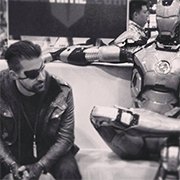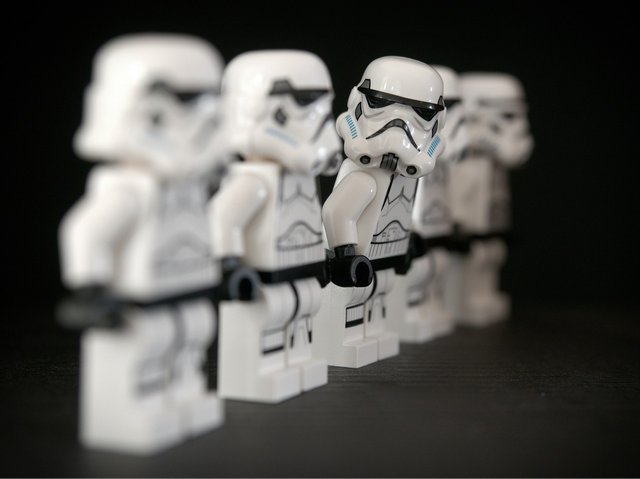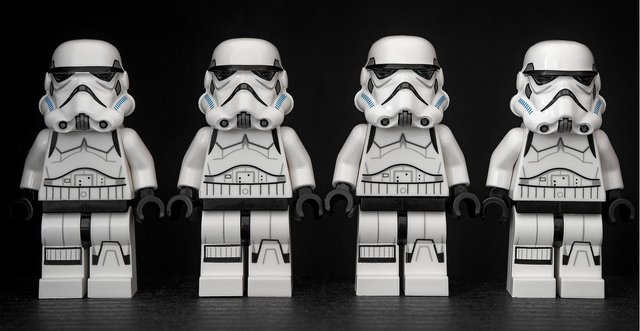How to Express Yourself In Conversation: Identity and Storytelling
We all tell stories, but do you ever think about what your conversational stories say about you? Do you ever think about how people interpret them, and do you ever wonder if those interpretations match up with your personal interpretations?
By spending a little time workshopping and refining your conversational stories you can gain significant control over how people interpret them.
Think of it like this: Every story manifests puzzle pieces, about who you are, in the minds of your listeners. The people you're talking to fit those puzzle pieces together and unconsciously create their personal identity for you.
Every story you tell elicits judgments. There's nothing you can do about this; humans have to put stories together in their heads, it's a concept called closure. If we juxtapose images, we link them, and create a narrative. If you want to learn more about closure, in general, check out Understanding Comics.
With this knowledge, a storyteller can learn to express themselves more accurately and effectively.
A Quick Experiment
I have a friend who's has tattoos, black hair, and wears military boots.
After reading that sentence:
- Did you imagine a person?
- What did this person's face look like?
- How was this person was standing?
- Was this person male or female?
- What did you think about this person?
- Did you create any personality traits?
- Did you make any judgments about this person?
Remember, that the only traits I told you about were physical, but you still imagined a more intricate person, right?
The same thing happens with stories. The more information you pick up, the more mental alchemy can take place, and in your mind, the person becomes more defined.
Identity Focused Storytelling
If you tell a story enough, you'll start to learn the responses people have to it, and those responses can indicate what identity puzzle pieces you're manifesting in their minds.
It's possible that your personal interpretation of the story and what it says about you don’t match up. So, it's worth taking another look at the story and learning to tell it in a new way; one that it expresses your identity closer to the way your perception.
By paying attention to what stories you tell, how you tell them, and the common interpretations of them you can gain a significant amount of control over the identity you're developing in conversation.
This can is a great benefit when it comes to social interaction. Imagine being able to express yourself more precisely on a date or during a job interview and knowing that the other person is on the same page as you.
Personally, I’ve noticed that the better I understood other people’s interpretations of my stories, the less anxiety I had in social situations and the easier it was to make friends.
Next time you're out socializing:
- Pay attention to the stories you tell.
- Pay attention to the way people respond.
- Pay attention to whether you have to clarify something after telling a story.
When you get home:
- Think about what identity puzzle pieces you might be manifesting through the stories you told.
- Is this what I want to say about myself?
- If not, how can I tell my stories differently so that they're interpreted more closely to the identity I want to share?
Start Focusing The Story:
- Take one of the stories you tell often and write it down. Imagine someone else told you this story, what comes to mind.
- What do would you think about the person who told you this story?
- Is there a way that they could have told it that results in a different perspective of them?
- Spend some time rewriting the story. You’re not making anything up or lying you’re simply restructuring it.
- Next time you’re out, tell the new version of the story, and see how people respond.
For more on how to develop your personal stories check out these posts:
How to Become a Great Conversational Storyteller
How To Improve Your Conversational Storytelling
Become a Great Conversational Storyteller: Conflict and Resolution
Thanks for reading!
Sources: StormTroopers, Stormtrooper2



I lke your evocative analogy: 'mental alchemy '
Oral story telling is somewhat a lost art, in everyday social life. I've never been good at it. I'm enjoying these posts.
It's definitely worth putting some thought into, it can really change the way you interactions go. Thanks for reading!
after i read military boots i thought = boot licker
Lol so did I for some reason.
I find that when I am proofreading for understanding somehow reading out loud in other people's voices really helps me understand what they might be getting out of it. For instance when I read that descriptive sentence "I have a friend who has tattoos, black hair, and wears military boots" it comes off totally different in old racists grandma voice then it does in my normal voice.
That's interesting. Any ideas why you think that happens?
I think the actor comes out. Like when you are doing an impression you don't just change the tone and speech rate. But you add things like body gestures. You don't continue to use the same words, but change to fit where they are from and what they did in their life. This is applied to reading in another's voice as it slightly changes the thoughts in your brain to fit the person you are trying to be.
I think the phrase "fake it till you make it" applies here also, as it shows over time the profound effect this can have on your brain.